Sustainability has long been more than a “nice to have” feature for any business, whatever the sector.
Investors, customers and the media are demanding action; net-zero and ESG targets have to be set and met, and environmental credentials are increasingly crucial for recruitment.
However, commercial and industrial waste has been rising since 2014 and making your business more sustainable is a complex topic including supply chains, energy, travel, paper, water, waste and more.
Some businesses are addressing the need to reduce waste much more widely - and finding ways of being a better employer at the same time.
One example is OLIO, the sharing mobile app that makes it easy to share unwanted food and other items. With more than 5 million users and a recent round of investment, OLIO's ambition to fight day-to-day waste and support businesses is gaining momentum.
We spoke to OLIO co-founder Saasha Celestial-One to find out more as part of our Building Better Business series.
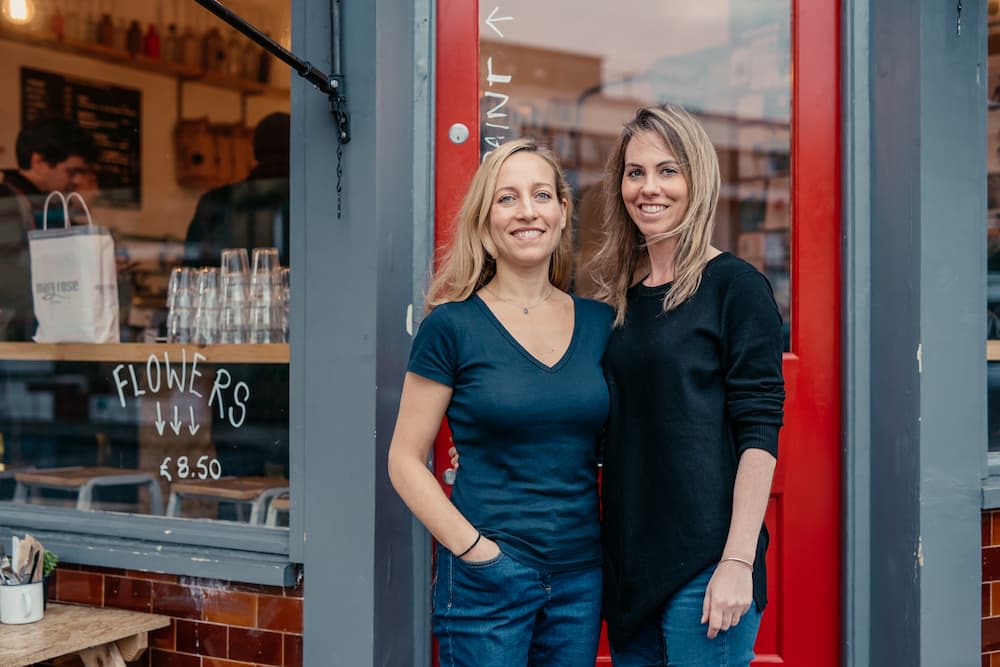
Saasha, you founded OLIO with Tessa Clarke. What is OLIO’s story? Why did you launch it?
"My co-founder Tessa and I both had similar upbringings in many ways - the difference is in the details. I describe my childhood as being raised in a family of hippies - I was the oldest of six kids, and we didn't grow up with a lot of money.
I spent my childhood following my mom around town, gathering things that other people threw away, either to use them ourselves or pick them up and sell them on. I really learned a lot - it instilled in me a deep aversion to waste of all kinds.
Tessa’s background is similar in that she’s a farmer's daughter - her dad still gets up at three in the morning or something crazy to milk the cows. She would never dream of letting food go to waste.
Tessa and I were sort of spiritual buddies - we bonded over our deep appreciation of the environment (as well as sambuca shots and dancing) when we met in business school 15 years ago.
For a while, we both sort of rebelled against our upbringing with very traditional corporate careers - we’ve got well over 30 years of experience as management consultants between us. But over the years, we talked extensively about starting a business together. At the end of 2014, we were both at a bit of a career crossroad, we were both new mothers and we were really starting to think about what kind of world our children would inherit.
We looked for an environmental challenge that we could tackle at scale, to make the most out of our collective skills and experience and make a difference to the world. Finding something that we wanted to do but which would have a significant enough impact was difficult, but then an experience Tessa had while moving house sowed the seeds for OLIO.
She found herself on moving day with some non-perishable food that the removal men wouldn't let her pack. She tried to give them away on her street and nobody would take this perfectly good food.
Because she hates waste, she ended up smuggling the food into her boxes, but that was the lightbulb moment - we both realised this was a ridiculous problem. There certainly were people nearby who would have loved this delicious food but knocking on strangers’ doors isn’t the most efficient way to connect that food with people.
Of course, it’s been a long journey from there to where we've grown to today, where OLIO solves that problem. "
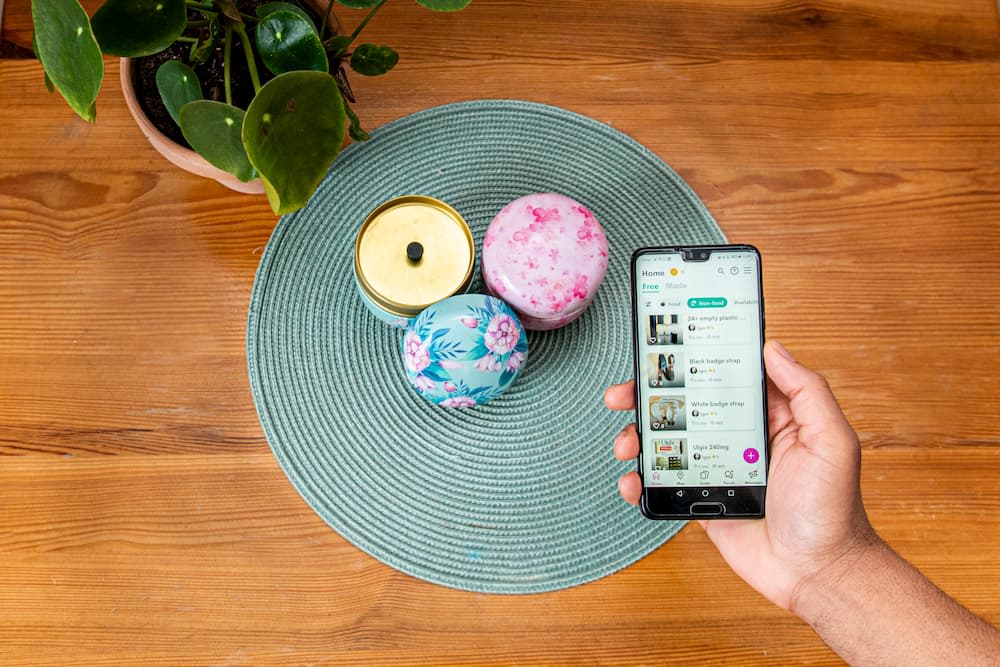
How does the OLIO app actively reduce food waste?
"OLIO is straightforward to use. It connects neighbours with each other directly to share food and other household items - things that are no longer wanted but still have value don’t wind up in landfill.
If you've got something, you just take a picture at a brief description and click Submit. OLIO will broadcast that item’s availability to your neighbours based on their personal preferences and how they set up their notifications.
Someone who wants the item can send you a message on the app, pop around, and you have a neighbour-to-neighbour exchange that happens on the doorstep. We’ve built up a community of over 5 million people worldwide who share our values and hate the idea of waste.
We often say that our species didn't evolve to throw away perfectly good stuff, so it feels painful to do that. Conversely, it feels incredibly good to give something of nutritional or other value to another human. To put some figures on the impact, we’ve now seen over 30 million portions of food shared directly between neighbours in 59 markets."
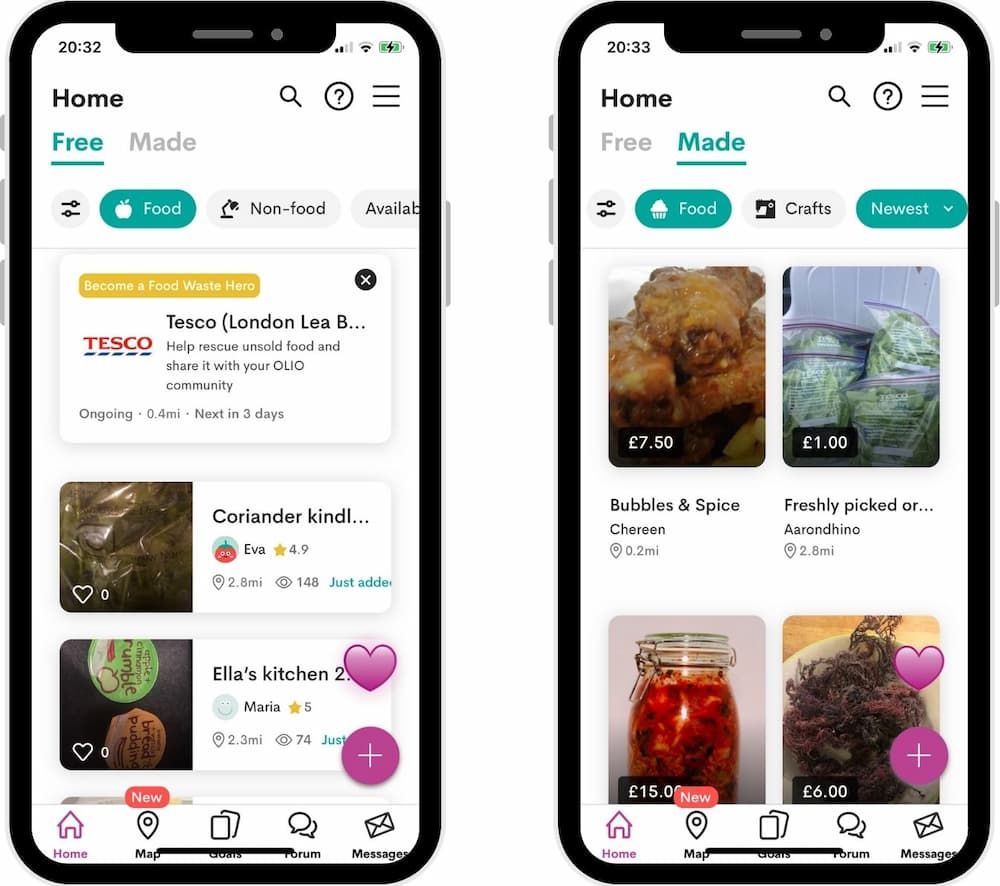
That’s a fantastic achievement for the planet and people - but you need to have a sustainable business financially as well. How does OLIO make money?
"We make money by providing a service to businesses who want to achieve zero edible waste, whether that's a retailer, a fast food outlet, or caterer. Companies like this either have net-zero targets, or employees or customers are scrutinising their food waste.
The reality is that there's so much perfectly good surplus food that even discounts and charity donations will often still leave something like 80% of the surplus at the end of the day.
So our solution is our Food Waste Heroes programme. We recruit and train volunteers from our community who collect that surplus food, take it straight home and then add it on the app - they get to keep 10% for themselves as a thank you.
We've now got 33,000 trained Food Waste Heroes collecting from several thousand food businesses all over the UK, including national contracts with retailers like Tesco and Pret a Manger."
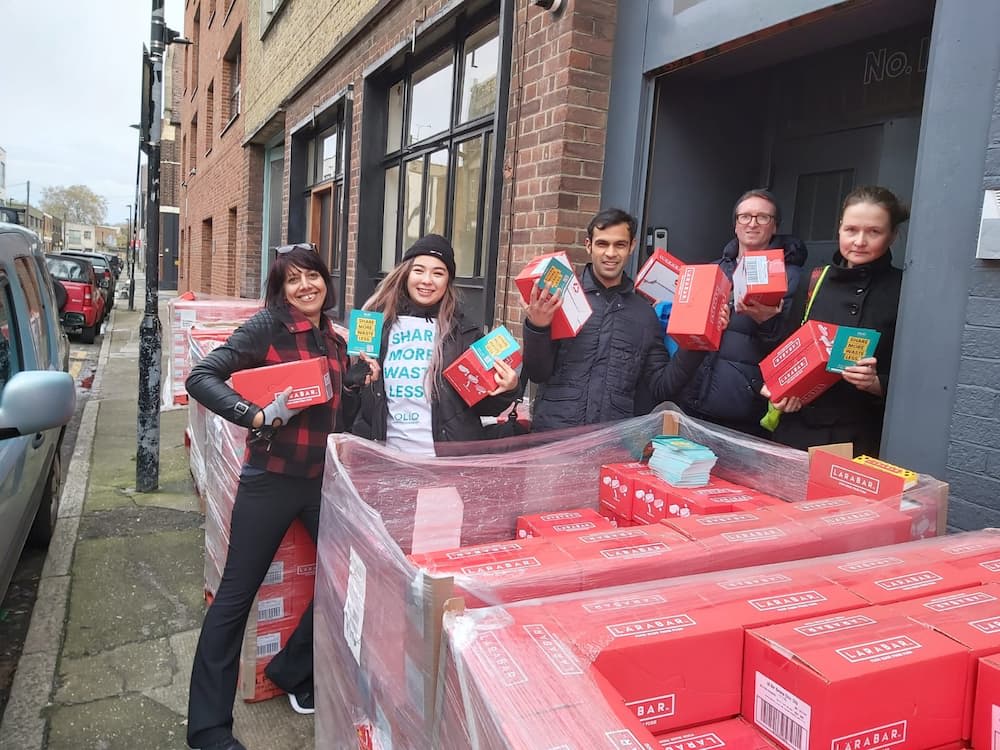
You’ve talked about being a “hippy entrepreneur” - what does that mean for you, and do you think this is the era of “hippy” entrepreneurship?
"Well, I specifically use that term because my parents were about as hippy as you could get - before the COVID vaccine, I was never vaccinated, was raised a vegetarian, was born in a barn, following the Grateful Dead every summer for 13 years.
But my parents were also entrepreneurs; they founded Frontier Natural Foods which eventually became the second-largest distributor of herbs and spices in the UK.
So that’s where the hippy entrepreneur phrase came from - but you can take a step back from that image and replace the word “hippy” with the word “social”.
Social entrepreneurship is basically not just focusing on profit at all costs but thinking more about profit with purpose - whether we can have an impact beyond the bottom line for our various stakeholders and the planet.
And this is borne out by the fact that capital is flowing into social enterprises - it’s not just that investors want to hit ESG targets but that there is an impetus from customers, boards, and the media to do more good. Compared to the overall capital available, it’s still not huge, but it's a meaningful amount from a historical perspective.
I also think that people want to do something meaningful and feel like they're spending their waking hours doing something worthwhile. I’m seeing more willingness to sacrifice big paycheques among both younger people and people who are mid-level in their careers.
It’s important to say that working in a social enterprise doesn’t mean that sacrifice is a given, but people are prioritising something that they find meaningful that might make the world a better place. We certainly see that in terms of the talent that applies to work with us and our retention of our employees, compared to some of my peers in something like a Fintech SaaS businesses or other sectors outside of social entrepreneurship.
There’s a much more increased awareness of the need for social entrepreneurship - we're getting closer and closer to that “no turning back point” for humanity.
We know governments aren't working nearly as fast as they should - they’re not providing us with any sort of sense that there might be a way out of this crisis. And I think that creates an urgency for people who focus on solving really big problems, especially environmental ones."
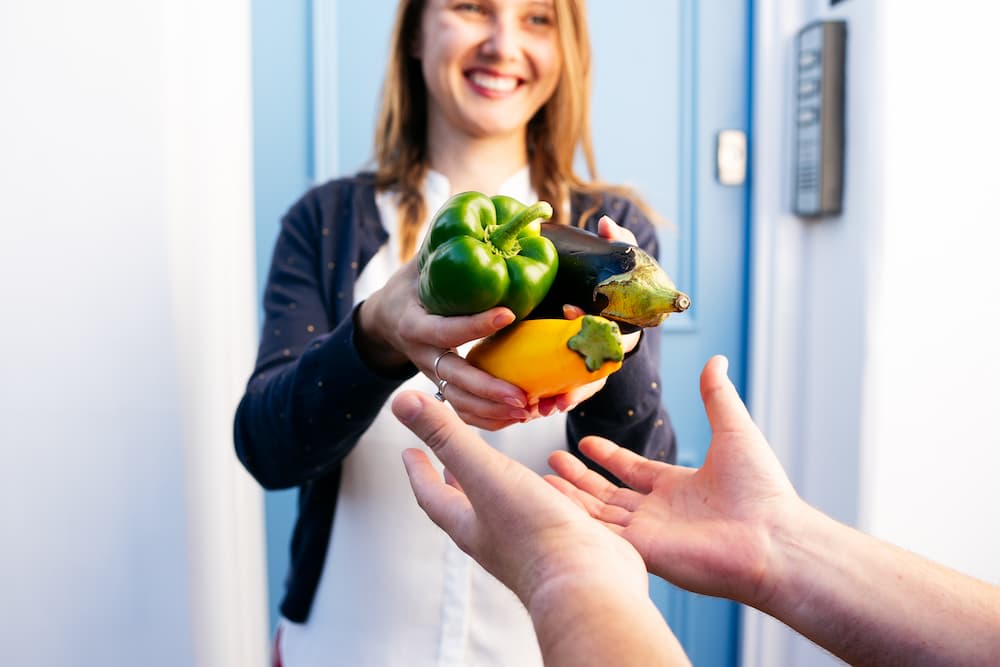
If somebody said technology, or an app, isn’t going to change the world, what would you say to that?
"I mean, honestly, no-one's ever said that to me! And so this is just purely a hypothetical response, but it would probably be - if you've got the answer as to how and what and who will change the world, definitively, then you should be doing something else rather than talking to me, because that's a lot of power and insight.
And I don't personally think anyone has that power. A couple of thoughts that spring to my mind are that we're trying to change mainstream consumer behaviour at scale - and of course, that is really, really, really hard, and it’s going to take time. It’s going to take a lot of magic in a formula that I don't necessarily have the ingredients for at this point in time.
But we need to meet people where they are and where people are is on their phone, and they're on an app.
So we need to make space for all different kinds of interactions - offline and in-person through discourse - but we have a forum section on OLIO which is incredibly active - people can share positive experiences, concerns, ask for recipes, share tips for sustainable living, and so on. By connecting people, they’re influencing each other and encouraging each other - we're just a platform.
If we try to force people, we aren't going to be able to change the world, but you know who can change the world? Millions of people all deciding to do something slightly different in their lives to make one positive step or change in their life, one after another. And collectively, when you get enough people doing that, that is transformational.
And I think we've seen that in the past when all of a sudden we’ve reached a tipping point in society, where we say things like smoking indoors isn't the best, we're not going to do it anymore; or we’re going to recycle."
ESG is a focus for the investment community and you've recently raised a large amount of funding through Series B. Are larger investors genuinely interested in ethical and social goods technology? Or is it simply a tick-box exercise?
"I don't think our investors are ticking the box with us at all; I think they believe that we can get to our ambition of a billion people using OLIO to live more planet-friendly and connected lives. And that's going to make them a lot of money. Now, luckily, for us, that is not in any way in contradiction with what we care about, which is impact.
The more people who use OLIO to share more, to prevent more food or anything else we're going to waste, can have a real, large-scale impact. For example, we're launching a section in the app next month where people can lend and borrow household items. Just think about the effect that would have at scale - if there was only one lawnmower per street, as opposed to 25, for example. We just have too much stuff in this world and don't draw down on the useful life of items - 90% of products produced each year are only used for less than a year.
Where I'm going with this is - there's no conflict between the needs of investors and the impact OLIO is aiming for. To get to a significant investment, we need to show that the upside from a commercial perspective is very attractive - and potentially outsize.
OLIO really is universally applicable, and we see it being used all over the world - anyone can use it anywhere. For investors, the fact that it also happens to help them meet their ESG is icing on the cake."
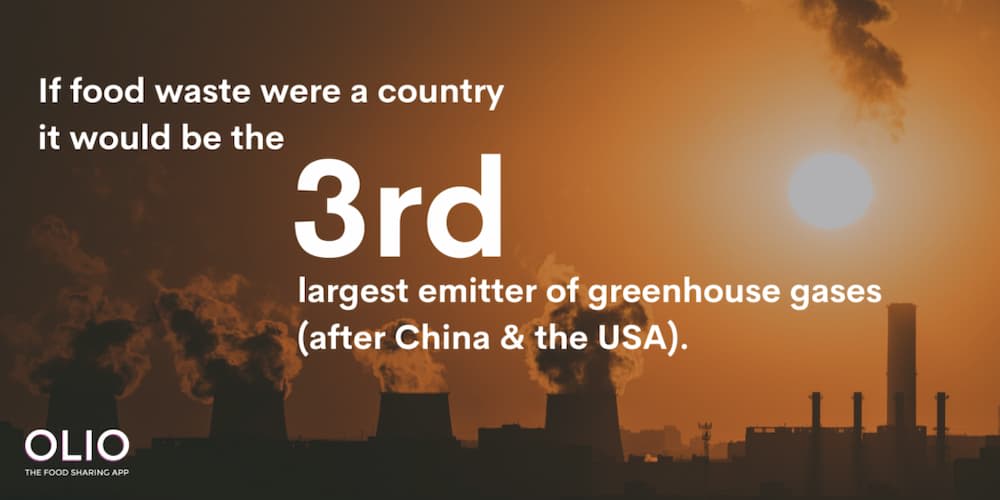
Lots of businesses, like TipJar for example, use Guild for investor communities to communicate with investors and leverage their experience, contacts, and partners. Do you have a community for your investors?
"We have a pretty small group of investors so we just have an email group to facilitate communication. But I belong to other communities, founders’ communities, female founders’ communities, food tech communities etc across many different platforms, including Guild.
It is vital to facilitate easy communication and interaction between members of different communities.
Guild is a community platform. Like OLIO we’re “the tech”, to help people build and leverage their communities. Do you define yourself as a community-led business? And if you do, is there any other way to do business in 2021?
"Yes, there is. One thing that bothers me is when people throw the word 'community' around when I'm not sure they have authentically built or created a community.
It’s one of those words - like 'revolution' - that is just way overused. There are certainly loads of businesses that are incredibly successful, but use the word community as a shortcut for something like their social media followers. And they're just not the same to me.
A community isn't necessarily something anchored around a Twitter handle or a social media platform.
That’s not to say that you can't build dialogue or engagement, but let's take a direct-to-consumer brand as an example. They're selling people subscriptions, they might have an active social media following, but I wouldn't say they have a community. But they can still be successful.
I think what a community does is make gives you a sense of defensibility. When the next direct-to-consumer challenger comes along.
Community can help a company have genuine brand loyalty and defensibility - a kind of protective moat against the competition.
People will stick with a community a lot longer than they'll stick with a product or service.
And it's hard to build a community. There are best practices, but it's not something you can do A, B, C, and D, and then all of a sudden, you've got people who want to talk to each other regularly without being prompted, and it's spontaneous, people referring friends and an off-the-scale NPS.
So yes, I think people can build a successful business in 2021 without 'community', but it might not be as defensible as one that has invested in and nurtured a community."
That is genuinely the best answer I've ever heard to that question! Online Community is often ill-defined, and you've done it beautifully. Are there any specific business philosophies or management philosophies that OLIO is built on?
"Well, we have quite a few, but I’ll bring it back just to our company values. Our values are the same for everything from recruitment, to prioritising projects, to evaluating employee performance, to evaluating ourselves. And they are:
Inclusive - which for us is not in the sense of “diversity” but more about coming back to the word community. Our values are about empowering others in our community to help us achieve our mission.
Resourceful - which is really about an MVP-first approach. Our time is our most precious asset, so we make decisions very quickly. We live in a test, experiment, learn, sort of mindset and way of working and we take the initiative.
Caring - is another of our values - ultimately, without our people, we are nothing. And first and foremost is our employees’ well-being, both mental and physical. We give people the autonomy and the mandate to look after themselves and put themselves first - it's only then that they can bring their best work to us.
Ambitious - is our final value, which is explained as if you’re going to do something, you might as try to do it in style.
Add an extra zero to the end of whatever it is you're aiming for, or shoot for the stars, and you'll get just a little bit closer than if you shot for the moon.
All of these values come together, and we use them as our guide - and we share them on our website for anyone who wants to see them.
The business principle is, know what your company values are, spend time on them, and make sure that they really, really, really reflect what you are and who you want to be.
Once you have these values in place - your guardrails - then do everything from recruitment to performance management to self-assessment to company assessment to board reports around those values."
Any management books or podcasts, or business books that you would recommend?
"It depends on the stage of the entrepreneur - I love podcasts, I can’t stop listening to All In And, I also listened to every episode of 'Secret Leaders'.
I love 'How I Built This'.
The original Sam Altman series, 'How to build a start-up' , is excellent and timeless.
From a book perspective, it depends, again, where you are in your journey - The Founder’s Dilemma, The Mom Test, and The Lean Start-up are essential books for any product design. And I love to read memoirs like Shoe Dog."
What advice would you give to your younger self or any young entrepreneur?
"To younger entrepreneurs, I think what I would say is, it’s going to take up so much of your life, so don't compromise and work on something that you're not 100% passionate about. That would be the equivalent of marrying someone that you're not really in love with.
If you're going to get up every day, and just have that conviction that what you're doing is the most important thing in the world to be doing that day, you have to believe that you're solving a problem that the world needs solving.
So just figure out what that is. And then that's what will give you the rocket fuel to keep going."
Finally, if you weren't doing this job, what would you do? Or what would you be?
"I think I'd be doing another startup with Tessa, who I love working with and is an incredible, incredible co-founder.
But I'm really interested in angel investing and supporting young and diverse entrepreneurs, specifically those focused on climate technology and climate solutions. So I think at this stage, I’d probably be spending my time doing that."
Use Guild to build better businesses
A Guild user study conducted in September 2021 of a sample of 25,000 Guild users found that 24% were Founders, CEOs and other C-Suite executives. Saasha Celestial-One , Ben Brooks-Dutton, James Timpson and Sarah Brown are amongst a growing number of business leaders who value Guild as a network of trust and privacy.
Guild has been designed as a way for you to build communities stay close to your most valued professional contacts - connect, communicate and collaborate.
Images courtesy of OLIO
More Building Better Business Interviews
Learn from other innovative business leaders and brilliant thinkers who've spoken to Guild about building a better world through their business principles.
Timpson CEO James Timpson talks about Upside Down Management, trust, philanthropy and investing in the North of England
Sarah Brown founder of Pai Skincare and how the 'Pai' philosophy runs through the business
Join Guild 🤝
See for yourself how the Guild experience is different to WhatsApp, Slack, LinkedIn or Facebook Groups. Guild is a safe space to connect, communicate and collaborate with others.
Join us on a platform that is purpose-built for professionals and businesses.
- Just want to join some groups? Simply join Guild and then look through the discoverable groups and communities to find relevant ones to join
- Thinking of running your own community? With an elegant and simple to use, mobile-first UX you’ve got everything you need to start a community - custom branding, analytics, group and user management and support. Get started with your own community here with our free and enterprise options
Contact us if you want to know more or have any questions.